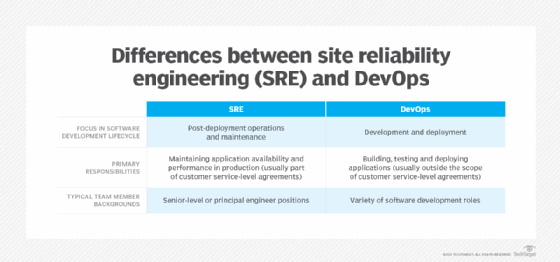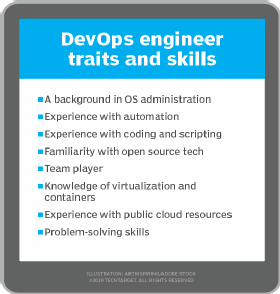SRE vs. DevOps: What's the difference?
The lines between site reliability engineering and DevOps aren't always clear. Building a harmonious relationship between the teams starts with understanding their distinct roles.
When appropriately managed, collaboration between site reliability engineering and DevOps teams improves security, resilience and efficiency -- but a poor relationship between SRE and DevOps can compromise operations.
Application delivery, with all its challenges, benefits from the shared accountability that a strong relationship between SRE and DevOps teams provides. SRE-DevOps collaboration is the only path to effective end-to-end management and incident response that both meets customers' needs and prevents crises from adversely impacting an organization.
What's the difference between SRE and DevOps?
The boundaries between SRE and DevOps vary depending on the organization, but the division usually falls between development and production.
A common and clear boundary is for DevOps teams to focus primarily on software development and deployment, while their colleagues on the SRE team focus on the ongoing operations and maintenance of software after deployment.
Service-level agreements (SLAs) often draw another boundary between SRE and DevOps teams. The SRE team maintains application availability and performance, whereas DevOps focuses on the development and deployment process. The latter typically falls outside the scope of a customer SLA.
In addition, SRE and DevOps teams usually bring different experiences that set them apart from each other. DevOps team members often come from software development and testing backgrounds. In contrast, site reliability engineers are more likely to have prior experience as a senior-level sys admin or operations engineer.

Another difference is the role of documentation. Technical documentation is integral to SRE team culture -- it's part of a site reliability engineer's job.
The same can't necessarily be said for DevOps teams, but the situation is starting to improve as teams look to preserve institutional knowledge, improve developer onboarding and safeguard their developers' cognitive load from unnecessary distractions.
SRE responsibilities and job duties
A site reliability engineer's job is to ensure the high availability, reliability and resilience of production systems and services. SRE responsibilities can encompass on-premises, hybrid cloud and public cloud environments in any given system.
Performance tuning and optimization fall on the SRE team, even in complex hybrid and multi-cloud environments. This requires automation and centralized tooling to ensure maximum team productivity. The SRE team automates deployment, scaling, monitoring and related tasks across these environments.
SRE teams also define and maintain customer SLAs within their area of responsibility. In addition, they provide technical and operations support to remediate cases of SLA system violations.
Designing, testing and implementing disaster recovery plans is also an SRE responsibility. This requires proactivity and ownership by SREs to ensure their team's response to a disaster situation is well-rehearsed and on point. Disaster recovery plans aren't meant to be shelfware; SRE teams should constantly test and improve their plans and practices.

Like their DevOps counterparts, SRE teams must continuously improve their processes, tools and infrastructure to promote system efficiency and resilience. Such continuous improvement is possible when teams implement appropriate monitoring tools and practices to analyze system performance and remediate performance bottlenecks.
SRE is a red-hot trend right now. Consequently, it's essential that someone on the SRE team tracks IT trends and emerging technologies to evaluate their suitability to improve the organization's SRE efforts.
SRE use cases
SRE teams focus on maintaining uptime and improving system reliability. Common use cases for SRE teams include the following:
- Proactive monitoring of system health to identify problems before they become significant issues that might impact operations and customer experience.
- Automation of routine site monitoring and related tasks to improve SRE productivity, reduce human error and free up SREs to work on more strategic tasks to improve site reliability and operations.
- Incident management, which includes both resolving the incident swiftly and putting the tools and playbooks in place to ensure that the incident won't happen again.
Problems SREs solve
SRE teams focus on large-scale problems that could cost organizations money due to system outages. Here are some of the problems they solve:
- Service disruptions. SREs have the monitoring, alerting and incident response tools and playbooks to mitigate problems that disruptions bring.
- Scalability challenges. These threaten the operations of commercial and public sector systems. Planning for increased workloads and traffic requires the specialized architectural expertise that SREs bring to large-scale enterprise operations.
- Slow response time. SREs address bottlenecks, optimize code and implement caching strategies to improve response times and meet customer expectations.
SRE tools
The SRE toolset focuses on site reliability monitoring and automation. Here are three prominent examples:
- Prometheus. An open source real-time monitoring tool, Prometheus allows SRE teams to easily track and understand metrics, making it an invaluable resource to ensure system reliability.
- Grafana. An open source data visualization tool that is widely regarded for its intuitive dashboards, Grafana supports a wide range of data sources and allows for easy interpretation of data, which is critical to identify patterns and potential issues.
- Kubernetes. This container orchestration tool enables the automation that SREs require to ensure scalability and efficiency of enterprise applications.
DevOps responsibilities and job duties
DevOps teams implement CI/CD pipelines to manage and maintain their organization's development infrastructure, including public cloud environments.
DevOps is responsible for automating the build, test and deployment processes to increase the speed and efficiency of application delivery. This isn't a one-and-done task; DevOps teams must approach this task with an eye to continuous improvement.
DevOps teams should aim to continuously improve the deployment process by making it faster, more reliable and more scalable. This requires the team to document and communicate improvements to the SRE team and other technical stakeholders.
Other DevOps responsibilities include ensuring the high availability and scalability of the systems they develop. DevOps also monitors and troubleshoots technical and security issues in development and testing environments.
Because DevOps remains a trendy topic, DevOps teams also must monitor industry trends -- such as the DevOps to DevSecOps transformation -- and regularly evaluate new tools that could improve the organization's DevOps efforts.

DevOps team use cases
Use cases for DevOps teams bridge the gap between development and operations, enabling faster software deployment, continuous improvement and the continuous delivery of services. DevOps teams automate repetitive tasks to remove human error and improve the overall efficiency of software development, delivery and operations. Automation accelerates software delivery velocity, giving organizations a time-to-market advantage.
Another DevOps team use case is software testing -- DevOps teams are responsible for testing software before they deploy it to internal and external customers.
Monitoring and logging are also DevOps responsibilities. DevOps teams must continuously monitor the systems to detect any anomalies or potential issues. As more DevOps teams move to the cloud, AI could begin to play a bigger part in data consumption and logging.
Problems DevOps teams solve
DevOps teams are responsible for alleviating and mitigating numerous problems that could crop up across the delivery pipeline. Lack of visibility into the delivery pipeline is one problem that DevOps teams rectify. By using observability tools, DevOps teams capture and interpret actionable data on the current state of their development software.
DevOps teams also face problems with the upheaval of waterfall software development. DevOps teams are responsible for pivoting their organization from legacy processes to the agility of DevOps. This pivot improves software delivery velocity, software quality and security.
Lastly, not all the problems that DevOps teams solve deal with technology. DevOps teams must also tackle cultural barriers such as communication silos that stymy collaboration amongst developers and stakeholders across their organization.
DevOps tools
The DevOps tools market is changing as enterprises contemplate either standardizing with an end-to-end DevOps platform such as GitLab, GitHub or jFrog, or continuing to build their own toolchains using open source tools.
Here are some open source DevOps tools to consider:
- Jenkins. A continuous integration and delivery tool that automates various aspects of project development, Jenkins speeds up the development processes and detects bugs and errors early.
- Kubernetes. The industry standard container orchestration tool is often first put into use by DevOps teams before becoming an SRE tool.
- Docker. Software container platforms like Docker help DevOps teams create, deploy and run applications via containerization.
The DevOps engineer
A DevOps engineer oversees both software development and deployment. In recent years, the role has gained traction within DevOps teams, and many corporate org charts today call for DevOps engineers.
The DevOps engineer role is a manifestation of the need for IT departments to move with greater agility. DevOps breaks down silos between development and operations to build a functional working relationship between the two teams. Combining the efforts of developers and operations staff is integral to making feature-rich and reliable software products. A DevOps engineer fosters collaboration between these two groups.
DevOps engineers are skilled in a wide variety of tasks to provide leadership for DevOps initiatives. Skills they cover cross the entire DevOps toolchain.
Collaboration points and similarities between SRE and DevOps
To deliver secure and quality software, SRE and DevOps teams must collaborate on a few essential points.
When the organization launches a new feature or service, SRE teams should collaborate with their DevOps counterparts to ensure the scalability and reliability of the new offerings. This responsibility ties back to site reliability engineers' SLA and performance-tuning work.
SRE and DevOps work together to monitor their areas of responsibility and collaborate on responses when incidents occur. They must also collaborate on incident postmortems and root cause analysis, aiming to identify and resolve the underlying causes of the incident so that it won't happen again.
Security throughout the development lifecycle is becoming increasingly critical as teams try to do more with less while facing an ever-evolving cyberthreat landscape. Both DevOps and SRE teams can automate and secure toolchains to ensure the organization can deliver new features and bug fixes to its customers continuously and securely.
Configuration management and capacity planning are other areas that require DevOps-SRE collaboration. Each group can suffer if configuration issues arise in an application across their environments. Likewise, expertise and data from both groups are necessary to scale software to meet business needs while staying within budget.
Finally, SRE and DevOps can come together to communicate about technical projects outside the IT department. Using shared project management reporting and collaboration tools, DevOps and SRE teams can give executive stakeholders the end-to-end picture of a project's status or an incident in the organization's IT environment.
Will Kelly is a technology writer, content strategist and marketer. He has written extensively about the cloud, DevOps and enterprise mobility for industry publications and corporate clients. Will has worked on teams introducing DevOps and cloud computing into commercial and public sector enterprises.








